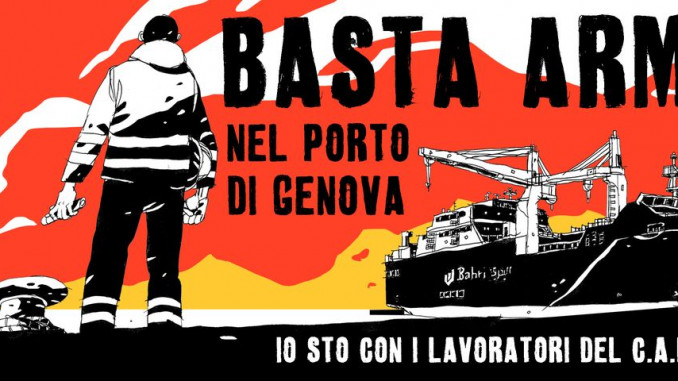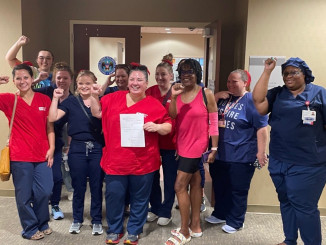
The Sumud Flotilla is now sailing to deliver aid to Gaza but has so far suffered two strikes by incendiary drones. Before the flotilla set sail, dockworkers in Genoa issued a promise to Israel: if the ships are harmed, the workers will refuse to handle any of the 13,000 containers that pass through on their way to Israel each year. They said, “We will not let a single nail leave anymore. We will launch an international strike, we will block the roads. We will block everything.” Now, they are making good on their promise by scheduling a strike for September 22, which will blockade all shipments to Israel. More than a strike by dockworkers, however, they have declared their intention for a one-day general strike that is finding support well beyond Genoa with multiple sectors and regions promising to take part.
The Genovese dockworkers are building on long-term rank and file organizing outside of traditional union structures by the CALP (Colletivo Autonomo di Labaratori Portualia / Autonomous Collective of Dockworkers). Founded in 2011, the CALP has built solidarity across workplace divisions created by capitalists – like contracts that divide workers into tiers with different wages and conditions. This has allowed them to build power at the docks. In a tightly linked global supply chain, workers have increased power at the ports. According to a founder of the CALP, the capitalist drive for efficiency has also turned these ports into bottlenecks, making them easier for strategic workers to block. He says, “One blockade, and you can shut down half the economy.“
The strike is scheduled for the same week as a second international port workers’ coordination meeting, to be held in Genoa on September 26-27. The meeting aims to “agree on an initial join mobilization initiative by European and Mediterranean ports on issues of peace and opposition to war.” Dockworkers in Genoa, Greece, Morocco, and France have already successfully blocked Israeli weapons shipments, but this meeting shows workers are ready to act internationally to stop the genocide in Gaza – and other imperialist wars. By coordinating internationally, workers can share information about weapons shipments before they even arrive at a port, giving them time to organize a response.
The Italian workers have taken up the slogan “We will not work for war!” We may all agree with this feeling, but most of us feel powerless to stand up and make this demand. By bringing together rank and file workers to build power directly in the workplace, and building international solidarity from there, the dockworkers have shown how learning to stand together can give workers the power to make a big international impact. As a founder of CALP put it, “This is what internationalism means to us: class struggle and anti-militarism as two sides of the same coin—because we understand that the weapons we load with our labor may one day be pointed at us.“




